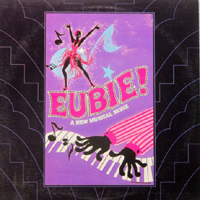 Original Broadway Cast, 1978 (Warner Bros./no CD)
Original Broadway Cast, 1978 (Warner Bros./no CD)  (2 / 5) The resurrection of Eubie Blake’s music in the 1970s was a joyous affirmation of the fact that even if genuine talent fades for a while, often it makes a comeback. Blake’s career had peaked in 1921 with the all-black Broadway hit Shuffle Along, but he was still around more than a half-century later — a charming nonagenarian making appearances on talk shows, telling great stories, and playing a mean piano. Blake also had some fine songs to his credit. While “I’m Just Wild About Harry” (lyrics by Noble Sissle) and “Memories of You” (lyrics by Andy Razaf) are the only two that most people remember, many others are worth reprising. In 1978, a few months after the Fats Waller tribute Ain’t Misbehavin’ opened, it was Blake’s turn. Forty years’ worth of his songs were performed by an energetic, all-black group of singer-dancers in a revue that just had to be titled with the composer’s euphonious, unforgettable first name — plus an exclamation point! The company included Gregory and Maurice Hines. It would be nice to report that the cast album is a winner, but it’s not a complete success. Part of the problem is that the material is inconsistent in quality. Blake was not Fats Waller, and while his melodies go from rags to blues to Tin Pan Alley, they aren’t always top-drawer. The arrangements are overblown, and the recorded sound is often unpleasant, as was the sound amplification in the theater. Many of the performers seem to have been directed to give subtlety a holiday and try to stop the show at every opportunity. “My Handy Man Ain’t Handy No More,” with its cheerfully dirty lyrics by Razaf, is a case in point. A song like this shouldn’t be blasted out, as Alaina Reed does here; double entendres are usually funnier when they’re not hammered home. Blake’s songs require more care than they received in this revue. — Richard Barrios
(2 / 5) The resurrection of Eubie Blake’s music in the 1970s was a joyous affirmation of the fact that even if genuine talent fades for a while, often it makes a comeback. Blake’s career had peaked in 1921 with the all-black Broadway hit Shuffle Along, but he was still around more than a half-century later — a charming nonagenarian making appearances on talk shows, telling great stories, and playing a mean piano. Blake also had some fine songs to his credit. While “I’m Just Wild About Harry” (lyrics by Noble Sissle) and “Memories of You” (lyrics by Andy Razaf) are the only two that most people remember, many others are worth reprising. In 1978, a few months after the Fats Waller tribute Ain’t Misbehavin’ opened, it was Blake’s turn. Forty years’ worth of his songs were performed by an energetic, all-black group of singer-dancers in a revue that just had to be titled with the composer’s euphonious, unforgettable first name — plus an exclamation point! The company included Gregory and Maurice Hines. It would be nice to report that the cast album is a winner, but it’s not a complete success. Part of the problem is that the material is inconsistent in quality. Blake was not Fats Waller, and while his melodies go from rags to blues to Tin Pan Alley, they aren’t always top-drawer. The arrangements are overblown, and the recorded sound is often unpleasant, as was the sound amplification in the theater. Many of the performers seem to have been directed to give subtlety a holiday and try to stop the show at every opportunity. “My Handy Man Ain’t Handy No More,” with its cheerfully dirty lyrics by Razaf, is a case in point. A song like this shouldn’t be blasted out, as Alaina Reed does here; double entendres are usually funnier when they’re not hammered home. Blake’s songs require more care than they received in this revue. — Richard Barrios
Category Archives: D-F
Ernest in Love
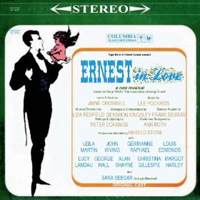 Original Off-Broadway Cast, 1960 (DRG)
Original Off-Broadway Cast, 1960 (DRG)  (3 / 5) Following the success of My Fair Lady, it seemed that witty and teddibly literate entertainment was what the theatergoing public craved, so lots of songwriters began plowing through all things British for anything that would allow a similar tuner to be adapted. In light of that mad scramble, it’s not surprising that Oscar Wilde’s The Importance of Being Earnest attracted lyricist-librettist Anne Croswell and composer Lee Pockriss. This is the romp in which the incomparable Victorian playwright twitted a couple of twits who woo two young damsels, one of whom has an inordinately proper mother. Luckily, Croswell and Pockriss brought sufficient elan to bear in a score’s that’s somewhat derivative but nevertheless has charm and lilt. While Croswell’s lyrics do not necessarily approach Wilde’s genius with an epigram, the show is by no means a travesty. Although it produced no chart climbers, it does boast “A Wicked Man,” which got some attention. “How Do You Find the Words?” is also a bit of all right, even if it sounds rather like something salvaged from the Lerner and Loewe discard bin. The speak-singing leading man that Rex Harrison validated in My Fair Lady is represented here by John Irving (not the novelist). Far superior vocalism comes from the pursued soubrettes, Gwendolyn (Leila Martin) and Cecily (Gerrianne Raphael). Sarah Seegar as Lady Bracknell delivers Croswell’s best rhyme — “satchel or” with “bachelor” — upon learning that, as a baby, her daughter’s suitor was found in a handbag. Gershon Kingsley provided the lively arrangements. — David Finkle
(3 / 5) Following the success of My Fair Lady, it seemed that witty and teddibly literate entertainment was what the theatergoing public craved, so lots of songwriters began plowing through all things British for anything that would allow a similar tuner to be adapted. In light of that mad scramble, it’s not surprising that Oscar Wilde’s The Importance of Being Earnest attracted lyricist-librettist Anne Croswell and composer Lee Pockriss. This is the romp in which the incomparable Victorian playwright twitted a couple of twits who woo two young damsels, one of whom has an inordinately proper mother. Luckily, Croswell and Pockriss brought sufficient elan to bear in a score’s that’s somewhat derivative but nevertheless has charm and lilt. While Croswell’s lyrics do not necessarily approach Wilde’s genius with an epigram, the show is by no means a travesty. Although it produced no chart climbers, it does boast “A Wicked Man,” which got some attention. “How Do You Find the Words?” is also a bit of all right, even if it sounds rather like something salvaged from the Lerner and Loewe discard bin. The speak-singing leading man that Rex Harrison validated in My Fair Lady is represented here by John Irving (not the novelist). Far superior vocalism comes from the pursued soubrettes, Gwendolyn (Leila Martin) and Cecily (Gerrianne Raphael). Sarah Seegar as Lady Bracknell delivers Croswell’s best rhyme — “satchel or” with “bachelor” — upon learning that, as a baby, her daughter’s suitor was found in a handbag. Gershon Kingsley provided the lively arrangements. — David Finkle
Elegies for Angels, Punks and Raging Queens
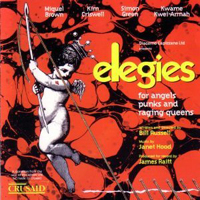 Original London Cast, 1993 (First Night)
Original London Cast, 1993 (First Night)  (5 / 5) An alternately heartbreaking, cathartic, and wonderfully humorous program of songs and monologues about AIDS victims and their loved ones, this show premiered Off-Broadway in 1987, but no cast album of that production was released. Inspired by the enormous Names Project quilt that memorializes those lost to AIDS, and also by Edgar Lee Masters’ Spoon River Anthology, the piece is a brilliant collaboration between Bill Russell (book and lyrics) and Janet Hood (music). The London cast recording includes none of the show’s many monologues but all of its songs — and what songs they are. In an uncommonly strong score, a highlight is “And the Rain Keeps Falling Down,” the lament of a man who can’t let himself cry over a friend’s illness. Mindful of the fact that an evening made up entirely of sad songs would be unbearable, Russell and Hood came up with some numbers that are funny (“I Don’t Do That Anymore,” “Spend It While You Can”), rousing (“Celebrate”), and/or inspirational (“Learning to Let Go”). This recording begins with the almost-title song “Angels, Punks and Raging Queens” in a touching rendition by Kim Criswell, who also excels in the score’s best known number, the heartbreaking “My Brother Lived in San Francisco.” The other three singers — Miguel Brown, Simon Green, and Kwame Kwei-Armah — are equally fine. — Michael Portantiere
(5 / 5) An alternately heartbreaking, cathartic, and wonderfully humorous program of songs and monologues about AIDS victims and their loved ones, this show premiered Off-Broadway in 1987, but no cast album of that production was released. Inspired by the enormous Names Project quilt that memorializes those lost to AIDS, and also by Edgar Lee Masters’ Spoon River Anthology, the piece is a brilliant collaboration between Bill Russell (book and lyrics) and Janet Hood (music). The London cast recording includes none of the show’s many monologues but all of its songs — and what songs they are. In an uncommonly strong score, a highlight is “And the Rain Keeps Falling Down,” the lament of a man who can’t let himself cry over a friend’s illness. Mindful of the fact that an evening made up entirely of sad songs would be unbearable, Russell and Hood came up with some numbers that are funny (“I Don’t Do That Anymore,” “Spend It While You Can”), rousing (“Celebrate”), and/or inspirational (“Learning to Let Go”). This recording begins with the almost-title song “Angels, Punks and Raging Queens” in a touching rendition by Kim Criswell, who also excels in the score’s best known number, the heartbreaking “My Brother Lived in San Francisco.” The other three singers — Miguel Brown, Simon Green, and Kwame Kwei-Armah — are equally fine. — Michael Portantiere
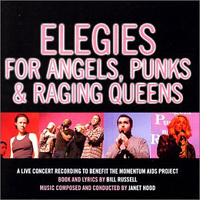 New York Concert Cast, 2001 (Fynsworth Alley)
New York Concert Cast, 2001 (Fynsworth Alley)  (5 / 5) This is a live recording of a concert version of Elegies…. that was performed as an AIDS benefit. Featuring a cast of 52, the concert was conducted by Janet Hood and directed by Bill Russell. The recording begins disappointingly with Alice Ripley’s forced rendition of “Angels, Punks and Raging Queens,” a song that wants a much more simple, less showy performance, but the rest of the singers are well matched to the material. Brian d’Arcy James lends his gorgeous voice to “And the Rain Keeps Falling Down,” Clent Bowers and Doug Eskew offer blessed comic relief in “I Don’t Do That Anymore,” and Emily Skinner’s singing of “My Brother Lived in San Francisco” is very special. (Skinner also duets with Ripley, her erstwhile Side Show twin, in “Celebrate.”) On hand as well are such talents as Alton Fitzgerald White, Orfeh, Amy Spanger, Stephanie Pope, Kane Alexander, Kathy Brier, Sharon Wilkins, and Kelli Rabke. The album ends grandly with Norm Lewis soaring through “Learning to Let Go” as the entire company sings backup and the audience claps along. Given that this is a live recording with no touch-ups, some of the performance sounds a bit raw, but that’s entirely appropriate to the subject matter. A major selling point of the album is that it includes six of the show’s monologues, delivered to full effect by Steve Burns, Erin Torpey, Veanne Cox, Bryan Batt, Christopher Durang, and Mario Cantone. — M.P.
(5 / 5) This is a live recording of a concert version of Elegies…. that was performed as an AIDS benefit. Featuring a cast of 52, the concert was conducted by Janet Hood and directed by Bill Russell. The recording begins disappointingly with Alice Ripley’s forced rendition of “Angels, Punks and Raging Queens,” a song that wants a much more simple, less showy performance, but the rest of the singers are well matched to the material. Brian d’Arcy James lends his gorgeous voice to “And the Rain Keeps Falling Down,” Clent Bowers and Doug Eskew offer blessed comic relief in “I Don’t Do That Anymore,” and Emily Skinner’s singing of “My Brother Lived in San Francisco” is very special. (Skinner also duets with Ripley, her erstwhile Side Show twin, in “Celebrate.”) On hand as well are such talents as Alton Fitzgerald White, Orfeh, Amy Spanger, Stephanie Pope, Kane Alexander, Kathy Brier, Sharon Wilkins, and Kelli Rabke. The album ends grandly with Norm Lewis soaring through “Learning to Let Go” as the entire company sings backup and the audience claps along. Given that this is a live recording with no touch-ups, some of the performance sounds a bit raw, but that’s entirely appropriate to the subject matter. A major selling point of the album is that it includes six of the show’s monologues, delivered to full effect by Steve Burns, Erin Torpey, Veanne Cox, Bryan Batt, Christopher Durang, and Mario Cantone. — M.P.
Elegies: A Song Cycle
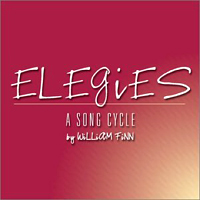 Original Off-Broadway Cast, 2003 (Fynsworth Alley)
Original Off-Broadway Cast, 2003 (Fynsworth Alley)  (5 / 5) In his songs for the theater, William Finn is often pointedly autobiographical; he seems happiest when dissecting his own thoughts with a sharp scalpel. Shying away from nothing, particularly not from death and grief, his Elegies: A Song Cycle is breathtaking in the depth of its commentary on the rewards and woes of being part of a family, a group of friends, and a society in good times and bad. “I wrote this song to not forget Mark’s all-male Thanksgiving,” he reports at the end of one number, and that statement is indicative of his tell-all compulsion as expressed in often free-form melodies and sometimes carefree rhyming. Though there are references here to people and places from Finn’s upbringing, he’s really chronicling the period of time bracketed by the advent of AIDS and the Twin Towers’ collapse (“Goodbye” includes remarks by someone phoning from the doomed buildings). There’s no denying that much of the song cycle’s brilliant content is painful, yet Finn invokes laughter amid tears. “Infinite Joy” may be the best song he has ever written — a marvel as delivered by Betty Buckley, for whom this sort of soaring anthem is ideally suited. The other classy warblers on this cast album, for which Vadim Feichtner did the musical arrangements and Gihieh Lee the vocal arrangements, are the lustrous-voiced Carolee Carmello, the commanding yet easy-going Michael Rupert, the earnest Keith Byron Kirk, and the delightful Christian Borle. It all adds up to infinite joy. — David Finkle
(5 / 5) In his songs for the theater, William Finn is often pointedly autobiographical; he seems happiest when dissecting his own thoughts with a sharp scalpel. Shying away from nothing, particularly not from death and grief, his Elegies: A Song Cycle is breathtaking in the depth of its commentary on the rewards and woes of being part of a family, a group of friends, and a society in good times and bad. “I wrote this song to not forget Mark’s all-male Thanksgiving,” he reports at the end of one number, and that statement is indicative of his tell-all compulsion as expressed in often free-form melodies and sometimes carefree rhyming. Though there are references here to people and places from Finn’s upbringing, he’s really chronicling the period of time bracketed by the advent of AIDS and the Twin Towers’ collapse (“Goodbye” includes remarks by someone phoning from the doomed buildings). There’s no denying that much of the song cycle’s brilliant content is painful, yet Finn invokes laughter amid tears. “Infinite Joy” may be the best song he has ever written — a marvel as delivered by Betty Buckley, for whom this sort of soaring anthem is ideally suited. The other classy warblers on this cast album, for which Vadim Feichtner did the musical arrangements and Gihieh Lee the vocal arrangements, are the lustrous-voiced Carolee Carmello, the commanding yet easy-going Michael Rupert, the earnest Keith Byron Kirk, and the delightful Christian Borle. It all adds up to infinite joy. — David Finkle
Eileen
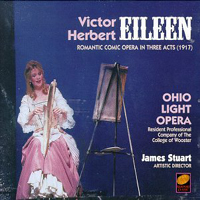 Ohio Light Opera Cast, 1997 (Newport Classics, 2CDs)
Ohio Light Opera Cast, 1997 (Newport Classics, 2CDs)  (3 / 5) Victor Herbert’s 1917 “romantic comic opera” is a beauty, every bar of it suffused with the master’s love of his native Ireland. Although Eileen ran but two months on Broadway, the score contains two songs that were big hits in their day, “Thine Alone” and “The Irish Have a Great Day Tonight,” plus a crowded program of heartfelt ballads, comic duets, and a half dozen outpourings of Irish nationalism, all gorgeously orchestrated by Herbert. So this first-ever complete recording of the show, taken from a live performance, should have been a cause for celebration when it appeared in 1997. It was, but distractions keep spoiling the party. First, the recording includes all the dialogue, and while Henry Blossom’s libretto isn’t bad for its florid type, it’s not the sort of thing you’ll want to listen to again and again. The acting and singing are brogue-heavy and variable in quality, with some real screeching on the high notes. The recording level is generally too low, yet the clomp-clomping of the chorus across the stage is loud and clear. Lynn Thompson’s conducting is melodramatic; Herbert himself probably wouldn’t have inserted so many portentous rallentandi and crescendi. Still, this is a great operetta score, one likely to win friends for the under-appreciated genre. The Ohio Light Opera production even exhumed “Blarney Is Our Birthright,” which probably hadn’t been heard since 1917. The company’s dedication is spectacular even when its execution doesn’t quite measure up. — Marc Miller
(3 / 5) Victor Herbert’s 1917 “romantic comic opera” is a beauty, every bar of it suffused with the master’s love of his native Ireland. Although Eileen ran but two months on Broadway, the score contains two songs that were big hits in their day, “Thine Alone” and “The Irish Have a Great Day Tonight,” plus a crowded program of heartfelt ballads, comic duets, and a half dozen outpourings of Irish nationalism, all gorgeously orchestrated by Herbert. So this first-ever complete recording of the show, taken from a live performance, should have been a cause for celebration when it appeared in 1997. It was, but distractions keep spoiling the party. First, the recording includes all the dialogue, and while Henry Blossom’s libretto isn’t bad for its florid type, it’s not the sort of thing you’ll want to listen to again and again. The acting and singing are brogue-heavy and variable in quality, with some real screeching on the high notes. The recording level is generally too low, yet the clomp-clomping of the chorus across the stage is loud and clear. Lynn Thompson’s conducting is melodramatic; Herbert himself probably wouldn’t have inserted so many portentous rallentandi and crescendi. Still, this is a great operetta score, one likely to win friends for the under-appreciated genre. The Ohio Light Opera production even exhumed “Blarney Is Our Birthright,” which probably hadn’t been heard since 1917. The company’s dedication is spectacular even when its execution doesn’t quite measure up. — Marc Miller
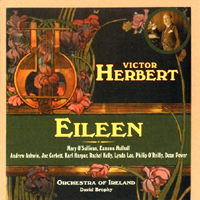 Studio Cast, 2012 (New World Records, 2CDs)
Studio Cast, 2012 (New World Records, 2CDs)  (4 / 5) Producer Larry Moore traveled to Ireland to record this complete rendering of the 1917 Herbert operetta. The Hibernian spirit comes through loud and clear; if you’re not Irish, you will be by the final chorus of “The Irish Have a Great Day Tonight.” Again, Herbert’s orchestrations are luscious (so much harp!), and this cast is excellent, with particularly fine work from Lynda Lee as Lady Maude and Dean Power as Dinny Doyle. Moore’s notes on the recording are informative, there are bonus tracks cataloging some beautiful cut material, and it’s all capped by a rousing orchestral suite. Plus, you don’t have to sit through all that uninteresting text, as with the Ohio Light Opera version. This would be a five-star recording but for one thing: David Brophy’s conducting tends toward the lethargic. “Too-re-loo-re” sounds like it’s heaving a one-ton weight behind it, and “Life’s a Game at Best” drags fearfully. Still, the performance overall is sumptuous and well worth hearing. — M.M.
(4 / 5) Producer Larry Moore traveled to Ireland to record this complete rendering of the 1917 Herbert operetta. The Hibernian spirit comes through loud and clear; if you’re not Irish, you will be by the final chorus of “The Irish Have a Great Day Tonight.” Again, Herbert’s orchestrations are luscious (so much harp!), and this cast is excellent, with particularly fine work from Lynda Lee as Lady Maude and Dean Power as Dinny Doyle. Moore’s notes on the recording are informative, there are bonus tracks cataloging some beautiful cut material, and it’s all capped by a rousing orchestral suite. Plus, you don’t have to sit through all that uninteresting text, as with the Ohio Light Opera version. This would be a five-star recording but for one thing: David Brophy’s conducting tends toward the lethargic. “Too-re-loo-re” sounds like it’s heaving a one-ton weight behind it, and “Life’s a Game at Best” drags fearfully. Still, the performance overall is sumptuous and well worth hearing. — M.M.
Debbie Does Dallas
 Original Off-Broadway Cast, 2003 (Sh-K-Boom)
Original Off-Broadway Cast, 2003 (Sh-K-Boom)  (2 / 5) The stage musical version of Debbie Does Dallas was conceived by Susan L. Schwartz and adapted by Erica Schmidt from the porno flick about a high-school girl’s attempts to fulfill her dream of becoming a Dallas Cowgirl. The show was most appealing for its dialogue, much of which was taken from the movie. The songs by Andrew Sherman, Tom Kitt, and Jonathan Callicutt are secondary in quality, not as funny as the dialogue, and uninteresting musically. The score is little more than an intentionally hokey collection of character numbers plus a couple of barely comic plot songs, with musical underscoring that pays homage to the soundtracks of the source film’s genre. Luckily, a good deal of dialogue is heard on the CD, and a fine cast — led by Sherie Rene Scott in the title role — makes listening to this recording an experience that’s almost enjoyable in a sort of sick way. Bonus tracks include karaoke mixes of a few of the songs and an “Orgasm Medley” in which select cast members give their all for the microphones. This is a cast album unlike any other. — Matthew Murray
(2 / 5) The stage musical version of Debbie Does Dallas was conceived by Susan L. Schwartz and adapted by Erica Schmidt from the porno flick about a high-school girl’s attempts to fulfill her dream of becoming a Dallas Cowgirl. The show was most appealing for its dialogue, much of which was taken from the movie. The songs by Andrew Sherman, Tom Kitt, and Jonathan Callicutt are secondary in quality, not as funny as the dialogue, and uninteresting musically. The score is little more than an intentionally hokey collection of character numbers plus a couple of barely comic plot songs, with musical underscoring that pays homage to the soundtracks of the source film’s genre. Luckily, a good deal of dialogue is heard on the CD, and a fine cast — led by Sherie Rene Scott in the title role — makes listening to this recording an experience that’s almost enjoyable in a sort of sick way. Bonus tracks include karaoke mixes of a few of the songs and an “Orgasm Medley” in which select cast members give their all for the microphones. This is a cast album unlike any other. — Matthew Murray
Dear World
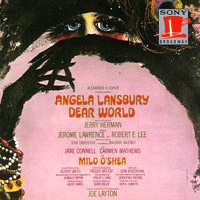 Original Broadway Cast, 1969 (Columbia/Sony)
Original Broadway Cast, 1969 (Columbia/Sony)  (2 / 5) Jerry Herman would seem to be the least likely composer to musicalize Jean Giraudoux’s The Madwoman of Chaillot, but he took on the challenge. The result, Dear World, was a four-month Broadway flop in 1969, although Angela Lansbury won her second Tony Award for her performance in the starring role. The cast recording reveals a score that’s schizophrenic but far from unappealing; Herman’s songs are tuneful, buoyant, and often evoke France, even if they seldom capture the atmosphere that infuses Giraudoux’s original play. There’s a rousing curtain raiser (“The Spring of Next Year”), a comic list number (“Garbage”), an infectious title song, and a curtain-call medley — all staples of Herman’s musical comedy oeuvre, but all somewhat out of place here. (The lovely ballad “I’ve Never Said I Love You” also seems out of place, yet Pamela Hall’s winning performance makes it forgivable.) Some of the other songs are more successful, particularly Lansbury’s emotionally surging “I Don’t Want to Know” and the hilarious overlapping trio of numbers sung by Lansbury, Jane Connell, and Carmen Mathews in the second act’s mad tea party. Every song, regardless of appropriateness, benefits from conductor Don Pippin’s vocal arrangements and Philip J. Lang’s orchestrations. Still, “Mame meets Madwoman” was a gambit never destined for success onstage or on disc. — Matthew Murray
(2 / 5) Jerry Herman would seem to be the least likely composer to musicalize Jean Giraudoux’s The Madwoman of Chaillot, but he took on the challenge. The result, Dear World, was a four-month Broadway flop in 1969, although Angela Lansbury won her second Tony Award for her performance in the starring role. The cast recording reveals a score that’s schizophrenic but far from unappealing; Herman’s songs are tuneful, buoyant, and often evoke France, even if they seldom capture the atmosphere that infuses Giraudoux’s original play. There’s a rousing curtain raiser (“The Spring of Next Year”), a comic list number (“Garbage”), an infectious title song, and a curtain-call medley — all staples of Herman’s musical comedy oeuvre, but all somewhat out of place here. (The lovely ballad “I’ve Never Said I Love You” also seems out of place, yet Pamela Hall’s winning performance makes it forgivable.) Some of the other songs are more successful, particularly Lansbury’s emotionally surging “I Don’t Want to Know” and the hilarious overlapping trio of numbers sung by Lansbury, Jane Connell, and Carmen Mathews in the second act’s mad tea party. Every song, regardless of appropriateness, benefits from conductor Don Pippin’s vocal arrangements and Philip J. Lang’s orchestrations. Still, “Mame meets Madwoman” was a gambit never destined for success onstage or on disc. — Matthew Murray
Eating Raoul
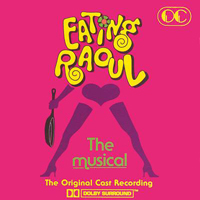 Original Off-Broadway Cast, 1992 (Bay Cities/Original Cast Records)
Original Off-Broadway Cast, 1992 (Bay Cities/Original Cast Records)  (4 / 5) Paul Bartel wrote the book for this musicalization of his cult-classic film, and he found ideal collaborators in lyricist Boyd Graham and composer Jed Feuer. Their score displays the same campy, goofy insanity as the flick. This tale of a couple repulsed by sex who join with a Mexican stud in a scheme to murder swingers in order to raise cash to buy a restaurant (really, don’t ask!) is told through a series of terrific, often hilarious numbers. Among them are the title song (the title phrase of which is rhymed with “kids in school,” “don’t be a fool,” and “rabbis in shul”), and two great trios, “Think About Tomorrow” and “Trio.” There is also a pair of late-show knockouts: a song-and-dance number called “Momma Said,” performed by a large man in a flowing dress, and the 11-o’clock stunner “One Last Bop.” Everything is well sung by the cast of nine, led by Eddie Korbich, Courtenay Collins, and Adrian Zmed. M. W Reid plays the guy in the dress, among other characters. Joseph Gianono’s orchestrations are overly synthesized — the band consists of two keyboards, guitar, bass, and percussion — but that doesn’t mask the undeniable fun of the score. — Seth Christenfeld
(4 / 5) Paul Bartel wrote the book for this musicalization of his cult-classic film, and he found ideal collaborators in lyricist Boyd Graham and composer Jed Feuer. Their score displays the same campy, goofy insanity as the flick. This tale of a couple repulsed by sex who join with a Mexican stud in a scheme to murder swingers in order to raise cash to buy a restaurant (really, don’t ask!) is told through a series of terrific, often hilarious numbers. Among them are the title song (the title phrase of which is rhymed with “kids in school,” “don’t be a fool,” and “rabbis in shul”), and two great trios, “Think About Tomorrow” and “Trio.” There is also a pair of late-show knockouts: a song-and-dance number called “Momma Said,” performed by a large man in a flowing dress, and the 11-o’clock stunner “One Last Bop.” Everything is well sung by the cast of nine, led by Eddie Korbich, Courtenay Collins, and Adrian Zmed. M. W Reid plays the guy in the dress, among other characters. Joseph Gianono’s orchestrations are overly synthesized — the band consists of two keyboards, guitar, bass, and percussion — but that doesn’t mask the undeniable fun of the score. — Seth Christenfeld
Dude
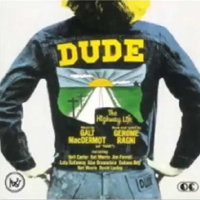 Original Cast Members, 1972 (Kilmarnock/Original Cast)
Original Cast Members, 1972 (Kilmarnock/Original Cast)  (3 / 5) Here’s one of Broadway’s legendary disasters, described by Otis Guernsey, Jr. in the Burns Mantle Yearbook as “an ardent questing for eternal verities of heaven and earth, life and death, youth and maturity, in the form of an unruly rock musical.” Perhaps, but it plays well on this recording, which was made some months after the show’s 16-performance run ended. You’ll be surprised that Dude was such a terrible flop when you hear the overture, which starts out majestically. The score is more bluegrass than rock, but Galt MacDermot’s music is always tuneful. Some show songs make you tap your feet, while more forceful ones make you briskly nod your head in tempo; Leata Galloway’s rendition of “I Am What I Am” is in the latter category, and so is Nell Carter’s “So Long, Dude.” The melody of the title song is quite good, although Gerome Ragni’s lyrics for it aren’t so special. Ragni is also responsible for Musical Theater’s Most Unlikely Song: “I’m Small,” in which a guy confesses to being terribly unwell-hung. The CD includes 10 cuts from a separate album of songs from the show that was recorded by the androgynous-sounding Salome Bey. All of these songs display MacDermot’s great gift for melody. We must mourn the fact that, throughout his career, he didn’t work with better collaborators and pick his projects more carefully. Whatever was wrong with Dude, MacDermot’s music wasn’t the problem. — Peter Filichia
(3 / 5) Here’s one of Broadway’s legendary disasters, described by Otis Guernsey, Jr. in the Burns Mantle Yearbook as “an ardent questing for eternal verities of heaven and earth, life and death, youth and maturity, in the form of an unruly rock musical.” Perhaps, but it plays well on this recording, which was made some months after the show’s 16-performance run ended. You’ll be surprised that Dude was such a terrible flop when you hear the overture, which starts out majestically. The score is more bluegrass than rock, but Galt MacDermot’s music is always tuneful. Some show songs make you tap your feet, while more forceful ones make you briskly nod your head in tempo; Leata Galloway’s rendition of “I Am What I Am” is in the latter category, and so is Nell Carter’s “So Long, Dude.” The melody of the title song is quite good, although Gerome Ragni’s lyrics for it aren’t so special. Ragni is also responsible for Musical Theater’s Most Unlikely Song: “I’m Small,” in which a guy confesses to being terribly unwell-hung. The CD includes 10 cuts from a separate album of songs from the show that was recorded by the androgynous-sounding Salome Bey. All of these songs display MacDermot’s great gift for melody. We must mourn the fact that, throughout his career, he didn’t work with better collaborators and pick his projects more carefully. Whatever was wrong with Dude, MacDermot’s music wasn’t the problem. — Peter Filichia
Dreamgirls
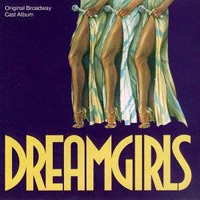 Original Broadway Cast, 1982 (Geffen/Decca Broadway)
Original Broadway Cast, 1982 (Geffen/Decca Broadway)  (2 / 5) What were they thinking? The most exciting Broadway score of the 1980s was carved up to fit on one disc, and thereby was stripped of its narrative drive and emotional punch. But what a score! Under the whip hand of director-choreographer Michael Bennett, librettist-lyricist Tom Eyen and composer Henry Krieger created a musical loosely based on the story of Diana Ross and the Supremes. This is no trashy tell-all; rather, Dreamgirls is an American epic, tracking no fewer than eight major characters as they climb to the top of the music industry. It’s a musical melodrama about ambition, adultery, lies, corruption, and betrayal, set to an irresistible Motown beat. Moreover, the authors have much to say about show business as a pathway to assimilation for black Americans, and the high cost of success. The disc preserves Harold Wheeler’s non-stop orchestrations and Cleavant Derricks’ electrifying vocal arrangements. The cast, including Sheryl Lee Ralph, Loretta Devine, Ben Harney, and Derricks, is first-rate — but Jennifer Holliday’s performance as Effie, the Dreamgirl who is cast out of the group and betrayed by her scheming lover/manager, seems more and more mannered upon repeated listening. Her rendition of the first-act finale, “And I Am Telling You I’m Not Going,” caused standing ovations in the theater; hearing it today, you may be unnerved by her wild, unrestrained vocalizing. Still, the big disappointment of this disc is what’s missing from it. Among the cuts are “Heavy,” the number that signals trouble brewing in the group, and much of the dazzling opening sequence that introduces all of the major characters. A remastered and expanded CD edition of this album does offer a little more material in the tracks While there are moments of excitement here, this groundbreaking musical didn’t get the treatment it deserved in the recording studio. — David Barbour
(2 / 5) What were they thinking? The most exciting Broadway score of the 1980s was carved up to fit on one disc, and thereby was stripped of its narrative drive and emotional punch. But what a score! Under the whip hand of director-choreographer Michael Bennett, librettist-lyricist Tom Eyen and composer Henry Krieger created a musical loosely based on the story of Diana Ross and the Supremes. This is no trashy tell-all; rather, Dreamgirls is an American epic, tracking no fewer than eight major characters as they climb to the top of the music industry. It’s a musical melodrama about ambition, adultery, lies, corruption, and betrayal, set to an irresistible Motown beat. Moreover, the authors have much to say about show business as a pathway to assimilation for black Americans, and the high cost of success. The disc preserves Harold Wheeler’s non-stop orchestrations and Cleavant Derricks’ electrifying vocal arrangements. The cast, including Sheryl Lee Ralph, Loretta Devine, Ben Harney, and Derricks, is first-rate — but Jennifer Holliday’s performance as Effie, the Dreamgirl who is cast out of the group and betrayed by her scheming lover/manager, seems more and more mannered upon repeated listening. Her rendition of the first-act finale, “And I Am Telling You I’m Not Going,” caused standing ovations in the theater; hearing it today, you may be unnerved by her wild, unrestrained vocalizing. Still, the big disappointment of this disc is what’s missing from it. Among the cuts are “Heavy,” the number that signals trouble brewing in the group, and much of the dazzling opening sequence that introduces all of the major characters. A remastered and expanded CD edition of this album does offer a little more material in the tracks While there are moments of excitement here, this groundbreaking musical didn’t get the treatment it deserved in the recording studio. — David Barbour
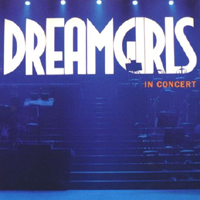 Concert Cast, 2002 (Nonesuch, 2CDs)
Concert Cast, 2002 (Nonesuch, 2CDs)  (5 / 5) This recording, based on a benefit concert presented by The Actors’ Fund, is an embarrassment of riches. The cast is led by divas Audra McDonald, Heather Headley, and Lillias White, and even the smaller roles are filled by the likes of Alice Ripley, Emily Skinner, Brian Stokes Mitchell, Malcolm Gets, Norm Lewis, and Patrick Wilson. Most important, the recording redresses a historical injustice by preserving the show in its entirety, giving listeners full access to the dramatic reach of the Krieger-Eyen score. It also preserves the Effie of Lillias White, a veteran of the original Bennett production. White’s sassy, spiky, yet deeply vulnerable performance is tops; she sings “And I Am Telling You I’m Not Going” as a hair-raising aria of heartbreak and rage, while her rendition of Effie’s Act II anthem “I Am Changing” is triumphant. McDonald and Lewis turn the duet “When I First Saw You” into a shattering confrontation, and Headley stirs up a whirlwind of comic fury as she tells off her married lover in “Ain’t No Party.” When all three ladies tear into the title number, you’ll be in Diva Heaven. There’s also fine work from Billy Porter as a James Brown-like figure whose career is skidding, and Darius de Haas as the group’s ambitious songwriter. The recording is pure gooseflesh from beginning to end, and one of the few really essential cast albums of the decade. [Ed. Note: Although this is presented as a live recording of the concert, it seems that a great deal of it was actually redone after the fact in a studio.] — D.B.
(5 / 5) This recording, based on a benefit concert presented by The Actors’ Fund, is an embarrassment of riches. The cast is led by divas Audra McDonald, Heather Headley, and Lillias White, and even the smaller roles are filled by the likes of Alice Ripley, Emily Skinner, Brian Stokes Mitchell, Malcolm Gets, Norm Lewis, and Patrick Wilson. Most important, the recording redresses a historical injustice by preserving the show in its entirety, giving listeners full access to the dramatic reach of the Krieger-Eyen score. It also preserves the Effie of Lillias White, a veteran of the original Bennett production. White’s sassy, spiky, yet deeply vulnerable performance is tops; she sings “And I Am Telling You I’m Not Going” as a hair-raising aria of heartbreak and rage, while her rendition of Effie’s Act II anthem “I Am Changing” is triumphant. McDonald and Lewis turn the duet “When I First Saw You” into a shattering confrontation, and Headley stirs up a whirlwind of comic fury as she tells off her married lover in “Ain’t No Party.” When all three ladies tear into the title number, you’ll be in Diva Heaven. There’s also fine work from Billy Porter as a James Brown-like figure whose career is skidding, and Darius de Haas as the group’s ambitious songwriter. The recording is pure gooseflesh from beginning to end, and one of the few really essential cast albums of the decade. [Ed. Note: Although this is presented as a live recording of the concert, it seems that a great deal of it was actually redone after the fact in a studio.] — D.B.
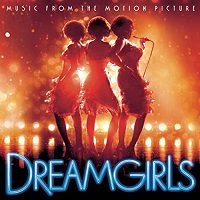 Motion Picture Soundtrack, 2006 (Columbia/Urban Soundtraxx)
Motion Picture Soundtrack, 2006 (Columbia/Urban Soundtraxx)  (3 / 5) Bill Condon’s seductive film version of Dreamgirls applies a patina of Douglas Sirk-style glamour to the narrative, but the soundtrack recording is a middling affair. The “deluxe edition,” which runs to 36 tracks across two discs, is much more complete — unless you turn to a streaming service like Spotify or Amazon, in which case say goodbye to a dozen tracks, including the infectious opener “I’m Looking for Something” and the climactic “Hard to Say Goodbye.” All 12 are missing from the highlights disc, with the exception of “Hard to Say Goodbye” — which, again, is not available to stream. (Confused yet?) The best reason for getting either edition is Jennifer Hudson, whose “And I Am Telling You I’m Not Going” throbs with heartbreak and fury. “I Am Changing,” her Act II self-affirmation, is another jolt of electricity. Beyoncé, ideally cast as the Diana Ross-like Deena Jones, has fewer opportunities, given her full workload of mostly girl-group numbers. Oddly, she is cut out of “When I First Saw You,” here made into a solo for the underpowered Jamie Foxx as Curtis, her Svengali-like lover/manager. (An unimpressive duet version is included in the extras.) But Beyoncé does her considerable best by “Listen,” a wrenching new aria that lays out Deena’s motivation for betraying Curtis. Other additions to the score include “Love You I Do,” a solo for Hudson that sounds like an ’80s-era Whitney Houston B-side; and “Patience,” a dullish trio for Eddie Murphy (solid as Jimmy, the fading James Brown figure), Anika Noni Rose (as Lorell, his disenchanted lover), and Keith Robinson (as C.C. White, Effie’s brother and the group’s songwriter). Overall, the soundtrack score is full of pluses and minuses: “Heavy” is reduced to 90 seconds and stripped of its dramatic exchanges, but “It’s All Over,” in which open warfare breaks out among the characters, really crackles. These collections are probably best enjoyed by Hudson fans and Beyoncé completists. A club mix version of “And I Am Telling You I’m Not Going,” included in the extras, is mad camp — it’s a tragedy you can dance to! — D.B.
(3 / 5) Bill Condon’s seductive film version of Dreamgirls applies a patina of Douglas Sirk-style glamour to the narrative, but the soundtrack recording is a middling affair. The “deluxe edition,” which runs to 36 tracks across two discs, is much more complete — unless you turn to a streaming service like Spotify or Amazon, in which case say goodbye to a dozen tracks, including the infectious opener “I’m Looking for Something” and the climactic “Hard to Say Goodbye.” All 12 are missing from the highlights disc, with the exception of “Hard to Say Goodbye” — which, again, is not available to stream. (Confused yet?) The best reason for getting either edition is Jennifer Hudson, whose “And I Am Telling You I’m Not Going” throbs with heartbreak and fury. “I Am Changing,” her Act II self-affirmation, is another jolt of electricity. Beyoncé, ideally cast as the Diana Ross-like Deena Jones, has fewer opportunities, given her full workload of mostly girl-group numbers. Oddly, she is cut out of “When I First Saw You,” here made into a solo for the underpowered Jamie Foxx as Curtis, her Svengali-like lover/manager. (An unimpressive duet version is included in the extras.) But Beyoncé does her considerable best by “Listen,” a wrenching new aria that lays out Deena’s motivation for betraying Curtis. Other additions to the score include “Love You I Do,” a solo for Hudson that sounds like an ’80s-era Whitney Houston B-side; and “Patience,” a dullish trio for Eddie Murphy (solid as Jimmy, the fading James Brown figure), Anika Noni Rose (as Lorell, his disenchanted lover), and Keith Robinson (as C.C. White, Effie’s brother and the group’s songwriter). Overall, the soundtrack score is full of pluses and minuses: “Heavy” is reduced to 90 seconds and stripped of its dramatic exchanges, but “It’s All Over,” in which open warfare breaks out among the characters, really crackles. These collections are probably best enjoyed by Hudson fans and Beyoncé completists. A club mix version of “And I Am Telling You I’m Not Going,” included in the extras, is mad camp — it’s a tragedy you can dance to! — D.B.
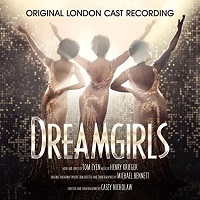 Original London Cast, 2017 (Masterworks Broadway)
Original London Cast, 2017 (Masterworks Broadway)  (3 / 5) It took Dreamgirls 35 years to reach London in a production, staged by Casey Nicholaw, that was intended to transfer to Broadway. It never got there, but it yielded a solid cast recording that prioritizes vocal pyrotechnics over incisive characterizations. (The album was allegedly recorded live, but the audience is heard only sparingly.) The main attraction here is Amber Riley, a veteran of TV’s Glee, who delivers the youngest-sounding Effie of any recording. This is an asset in the early sequences, when the characters, are teenagers, less so when Effie morphs into the sadder-but-wiser woman of “I Am Changing.” Nevertheless, despite some notably slow tempi, Riley’s two big solos are shiver-inducing. Other standouts include Joe Aaron Reid, incisive as Curtis, and Liisi Lafontaine as an appealingly coltish Deena. In terms of changes to the score, the sizzling Act II opener depicting the Dreams’ Vegas act (seen in the 1987 Broadway revival and heard on the 2002 recording) has been reworked but not improved, and “Listen” is reimagined as a duet marking Deena and Effie’s pained reunion after years of estrangement. Again, as in the movie, the number adds some welcome emotional heft. If you can’t find the 2002 concert cast album, this is an acceptable alternative; but it lacks some essential connective tissue, the high-pressure approach pushes every number to finale level, and a certain musicality is missing. If Dreamgirls is going dazzle, it needs room to breathe. — D.B.
(3 / 5) It took Dreamgirls 35 years to reach London in a production, staged by Casey Nicholaw, that was intended to transfer to Broadway. It never got there, but it yielded a solid cast recording that prioritizes vocal pyrotechnics over incisive characterizations. (The album was allegedly recorded live, but the audience is heard only sparingly.) The main attraction here is Amber Riley, a veteran of TV’s Glee, who delivers the youngest-sounding Effie of any recording. This is an asset in the early sequences, when the characters, are teenagers, less so when Effie morphs into the sadder-but-wiser woman of “I Am Changing.” Nevertheless, despite some notably slow tempi, Riley’s two big solos are shiver-inducing. Other standouts include Joe Aaron Reid, incisive as Curtis, and Liisi Lafontaine as an appealingly coltish Deena. In terms of changes to the score, the sizzling Act II opener depicting the Dreams’ Vegas act (seen in the 1987 Broadway revival and heard on the 2002 recording) has been reworked but not improved, and “Listen” is reimagined as a duet marking Deena and Effie’s pained reunion after years of estrangement. Again, as in the movie, the number adds some welcome emotional heft. If you can’t find the 2002 concert cast album, this is an acceptable alternative; but it lacks some essential connective tissue, the high-pressure approach pushes every number to finale level, and a certain musicality is missing. If Dreamgirls is going dazzle, it needs room to breathe. — D.B.
Drat! The Cat!
 Original Broadway Cast, 1965 (Blue Pearl/no CD)
Original Broadway Cast, 1965 (Blue Pearl/no CD)  (3 / 5) It’s a cliché among cast album collectors to hear a good score of a flop musical and ponder, “Why wasn’t this a hit?” But the recording of this eight-performance 1965 tuner is truly mystifying in that respect. Released in 1984, it’s taken from a live tape, and the audience is plainly having a marvelous time. Ira Levin’s daffy book concerns a bumbling cop pursuing a seductive jewel thief in circa-1890s New York. The snatches of dialogue on the record are met with appreciative chuckles and outright guffaws. Milton Schafer’s score is tuneful and spirited, and Levin’s deft lyrics accent the comedy. Elliott Gould’s rendition of the one hit song, “She Touched Me,” wins what sounds like a thunderous ovation. Even Joe Layton’s comic ballet “The Upside-Down Thief’ elicits gales of giggles. Best of all among the cast is a teenage Lesley Ann Warren as Alice, the diamond-pinching heiress; she’s a giddy delight in “Wild and Reckless,” a charmer in the tongue-twisting “Holmes and Watson” duet with Gould, and quite the pensive balladeer in “I Like Him.” Jane Connell turns up as Alice’s mother, making inimitably odd noises in the waltz ensemble “Dancing With Alice” and raging engagingly at Jack Fletcher in “It’s Your Fault.” The score and the performances are super. I would have upgraded my rating of the recording if it weren’t for the sound quality, which is pretty wretched overall. — Marc Miller
(3 / 5) It’s a cliché among cast album collectors to hear a good score of a flop musical and ponder, “Why wasn’t this a hit?” But the recording of this eight-performance 1965 tuner is truly mystifying in that respect. Released in 1984, it’s taken from a live tape, and the audience is plainly having a marvelous time. Ira Levin’s daffy book concerns a bumbling cop pursuing a seductive jewel thief in circa-1890s New York. The snatches of dialogue on the record are met with appreciative chuckles and outright guffaws. Milton Schafer’s score is tuneful and spirited, and Levin’s deft lyrics accent the comedy. Elliott Gould’s rendition of the one hit song, “She Touched Me,” wins what sounds like a thunderous ovation. Even Joe Layton’s comic ballet “The Upside-Down Thief’ elicits gales of giggles. Best of all among the cast is a teenage Lesley Ann Warren as Alice, the diamond-pinching heiress; she’s a giddy delight in “Wild and Reckless,” a charmer in the tongue-twisting “Holmes and Watson” duet with Gould, and quite the pensive balladeer in “I Like Him.” Jane Connell turns up as Alice’s mother, making inimitably odd noises in the waltz ensemble “Dancing With Alice” and raging engagingly at Jack Fletcher in “It’s Your Fault.” The score and the performances are super. I would have upgraded my rating of the recording if it weren’t for the sound quality, which is pretty wretched overall. — Marc Miller
 Studio Cast, 1997 (Varèse Sarabande)
Studio Cast, 1997 (Varèse Sarabande)  (3 / 5) The good folks at Varèse Sarabande assembled a top-drawer cast and a full orchestra to give Drat! The Cat! the recording it deserved, and this CD improves on the above album, but not in all respects. Certainly, the sound is a dozen times better. The accompanying booklet contains superior notes by Peter Filichia and an appreciation by author Ira Levin. Jason Graae, in the role created by Elliott Gould, makes a fine lead, and is even disarming in a hidden “bonus” track. There’s luxury casting all around: Judy Kaye, with an intentional spoof of an Irish accent, is the cop’s widowed mother; Elaine Stritch is his lady love’s harpy of a mama; and Jonathan Freeman is the object of Stritch’s considerable scorn. The recording retains the original orchestrations of Hershy Kay and Clare Grundman, and it includes lots of lead-in dialogue. On the debit side: As Alice, the jewel-thief “cat” of the title, Susan Egan weighs every line carefully and sings excellently, but there’s little of the giddy, naughty rich girl in her portrayal. For all of its assets, this Cat album lacks a certain theatrical spark. But you can’t really go wrong with either recording, even if the original has a very slight edge. — M.M.
(3 / 5) The good folks at Varèse Sarabande assembled a top-drawer cast and a full orchestra to give Drat! The Cat! the recording it deserved, and this CD improves on the above album, but not in all respects. Certainly, the sound is a dozen times better. The accompanying booklet contains superior notes by Peter Filichia and an appreciation by author Ira Levin. Jason Graae, in the role created by Elliott Gould, makes a fine lead, and is even disarming in a hidden “bonus” track. There’s luxury casting all around: Judy Kaye, with an intentional spoof of an Irish accent, is the cop’s widowed mother; Elaine Stritch is his lady love’s harpy of a mama; and Jonathan Freeman is the object of Stritch’s considerable scorn. The recording retains the original orchestrations of Hershy Kay and Clare Grundman, and it includes lots of lead-in dialogue. On the debit side: As Alice, the jewel-thief “cat” of the title, Susan Egan weighs every line carefully and sings excellently, but there’s little of the giddy, naughty rich girl in her portrayal. For all of its assets, this Cat album lacks a certain theatrical spark. But you can’t really go wrong with either recording, even if the original has a very slight edge. — M.M.
Do Re Mi
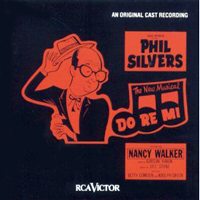 Original Broadway Cast, 1960 (RCA)
Original Broadway Cast, 1960 (RCA)  (2 / 5) Right after Gypsy, you’d have expected composer Jule Styne to test his powers in another meaty Broadway project. Instead, he regressed to formula musical comedy with this minor hit, reuniting with frequent collaborators Betty Comden and Adolph Green and his High Button Shoes star, Phil Silvers. As oneHubie Cram, Silvers played opposite another great clown, Nancy Walker, in a jukebox-industry spoof that may have had some resonance in the wake of the payola scandals. But the score lets the stars down: “Waiting, Waiting,” “Take a Job,” “Ambition,” and “Adventure” sound oddly unfinished, neither conforming to standard song structures nor having any special reason for avoiding them. Second couple John Reardon and Nancy Dussault fare somewhat better, and Reardon even gets to introduce “Make Someone Happy.” But the blaring Styne overture is all fanfare and no substance, and the 11-o’clock number “All of My Life,” sung by a heavy-breathing Silvers, doesn’t earn its right to breast-beat. Apparently, a lot of the show’s virtues were visual in Silvers’ shtick, Walker’s reactions, and a nubile assortment of chorus girls. Of course, none of that comes through on disc. — Marc Miller
(2 / 5) Right after Gypsy, you’d have expected composer Jule Styne to test his powers in another meaty Broadway project. Instead, he regressed to formula musical comedy with this minor hit, reuniting with frequent collaborators Betty Comden and Adolph Green and his High Button Shoes star, Phil Silvers. As oneHubie Cram, Silvers played opposite another great clown, Nancy Walker, in a jukebox-industry spoof that may have had some resonance in the wake of the payola scandals. But the score lets the stars down: “Waiting, Waiting,” “Take a Job,” “Ambition,” and “Adventure” sound oddly unfinished, neither conforming to standard song structures nor having any special reason for avoiding them. Second couple John Reardon and Nancy Dussault fare somewhat better, and Reardon even gets to introduce “Make Someone Happy.” But the blaring Styne overture is all fanfare and no substance, and the 11-o’clock number “All of My Life,” sung by a heavy-breathing Silvers, doesn’t earn its right to breast-beat. Apparently, a lot of the show’s virtues were visual in Silvers’ shtick, Walker’s reactions, and a nubile assortment of chorus girls. Of course, none of that comes through on disc. — Marc Miller
 Original London Cast, 1961 (Decca/TER/Sepia)
Original London Cast, 1961 (Decca/TER/Sepia)  (3 / 5) The middling Styne score doesn’t sound any more impressive as performed on the other side of the Atlantic, but it picks up some arresting oddities in this briskly conducted album. Most jarringly, in a very New York show filled with lyrical references to Far Rockaway, Brooklyn, and Dinty Moore’s, the mostly Brit cast makes no attempt at New York accents. Billed above the title is Max Bygraves, a mugging music-hall comic who manages to be a restrained and affecting Hubie; there’s real wistfulness in his “All of My Life.” The comedienne Maggie Fitzgibbon’s vocal part lies uncomfortably for her, and she makes some very painful noises. Jan Waters, an attractive ingénue, is sturdily partnered by the big-voiced American Steve Arlen in a sweet duet. Some cuts in the overture and a slightly thinned-out orchestra hurt this thin score not a bit. — M.M.
(3 / 5) The middling Styne score doesn’t sound any more impressive as performed on the other side of the Atlantic, but it picks up some arresting oddities in this briskly conducted album. Most jarringly, in a very New York show filled with lyrical references to Far Rockaway, Brooklyn, and Dinty Moore’s, the mostly Brit cast makes no attempt at New York accents. Billed above the title is Max Bygraves, a mugging music-hall comic who manages to be a restrained and affecting Hubie; there’s real wistfulness in his “All of My Life.” The comedienne Maggie Fitzgibbon’s vocal part lies uncomfortably for her, and she makes some very painful noises. Jan Waters, an attractive ingénue, is sturdily partnered by the big-voiced American Steve Arlen in a sweet duet. Some cuts in the overture and a slightly thinned-out orchestra hurt this thin score not a bit. — M.M.
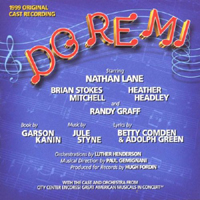 Encores! Concert Cast, 1999 (DRG)
Encores! Concert Cast, 1999 (DRG)  (3 / 5) City Center’s enterprising musicals-in-staged-concert series had a go at Do Re Mi in 1999, and the cast album of that production improves markedly on the original. For starters, Nathan Lane has more voice than Phil Silvers, and he probably inhabits this type of burlesque-influenced conniver better than anyone alive today. This is also a more complete recording than RCA’s; the lead-in dialogue and extra songs (“He’s a VIP,” “Who Is Mr. Big?”) help us make more sense of the flimsy plot, and the score is followed by a bonus track of a 10-minute interview with the songwriters from the 1960 recording session. Brian Stokes Mitchell’s creamy baritone sells the ballads, and Heather Headley is sweetly understated opposite him. She’s also fine in the send-up of 1950s pop-awfulness “What’s New at the Zoo?” As Kay Cram, Randy Graff works hard, but she’s not the intuitive comedic genius that Nancy Walker was. Paul Gemignani conducts with his customary snap. — M.M.
(3 / 5) City Center’s enterprising musicals-in-staged-concert series had a go at Do Re Mi in 1999, and the cast album of that production improves markedly on the original. For starters, Nathan Lane has more voice than Phil Silvers, and he probably inhabits this type of burlesque-influenced conniver better than anyone alive today. This is also a more complete recording than RCA’s; the lead-in dialogue and extra songs (“He’s a VIP,” “Who Is Mr. Big?”) help us make more sense of the flimsy plot, and the score is followed by a bonus track of a 10-minute interview with the songwriters from the 1960 recording session. Brian Stokes Mitchell’s creamy baritone sells the ballads, and Heather Headley is sweetly understated opposite him. She’s also fine in the send-up of 1950s pop-awfulness “What’s New at the Zoo?” As Kay Cram, Randy Graff works hard, but she’s not the intuitive comedic genius that Nancy Walker was. Paul Gemignani conducts with his customary snap. — M.M.
Doonesbury
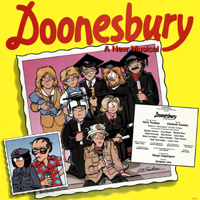 Original Broadway Cast, 1983 (MCA)
Original Broadway Cast, 1983 (MCA)  (2 / 5) For the stage musical version of his political-satire comic strip, Garry Trudeau fashioned his own book and lyrics, proving himself to be a surprisingly adept lyricist. He elicits honest laughs with “Another Memorable Meal,” about Mike Doonesbury’s pathetic culinary attempts, and “Complicated Man,” in which Honey and Boopsie torch about their difficult boyfriends. Nor does Trudeau leave out the satire, scoring anti-Reagan-era points in “Real Estate” and “It’s the Right Time to Be Rich.” Unfortunately, these savories are wedded to the shapeless, tuneless rock meanderings of composer Elizabeth Swados, who also did the clattering orchestrations. And while this is nominally a book musical, there’s very little narrative or character development in it; the ballads bob around on the surface, sounding like nothing more than Lite-FM selections. As rock musicals go, this one has more vocal power than most: Laura Dean’s Boopsie is a standout (especially in “I Can Have It All”), and Ralph Bruneau displays an attractive high tenor as Mike. Broadway notables Mark Linn-Baker and Barbara Andres get their chances, too, although the latter is paired with the vocally uncertain Kate Burton in an unmoving mother-daughter reconciliation number. The show was a bit small-scale for Broadway, which may have accounted for its short run, but the cast album is an evocative, cheeky time capsule. If there were some way to divorce Trudeau’s lyrics from Swados’ music, I might revisit it more often. — Marc Miller
(2 / 5) For the stage musical version of his political-satire comic strip, Garry Trudeau fashioned his own book and lyrics, proving himself to be a surprisingly adept lyricist. He elicits honest laughs with “Another Memorable Meal,” about Mike Doonesbury’s pathetic culinary attempts, and “Complicated Man,” in which Honey and Boopsie torch about their difficult boyfriends. Nor does Trudeau leave out the satire, scoring anti-Reagan-era points in “Real Estate” and “It’s the Right Time to Be Rich.” Unfortunately, these savories are wedded to the shapeless, tuneless rock meanderings of composer Elizabeth Swados, who also did the clattering orchestrations. And while this is nominally a book musical, there’s very little narrative or character development in it; the ballads bob around on the surface, sounding like nothing more than Lite-FM selections. As rock musicals go, this one has more vocal power than most: Laura Dean’s Boopsie is a standout (especially in “I Can Have It All”), and Ralph Bruneau displays an attractive high tenor as Mike. Broadway notables Mark Linn-Baker and Barbara Andres get their chances, too, although the latter is paired with the vocally uncertain Kate Burton in an unmoving mother-daughter reconciliation number. The show was a bit small-scale for Broadway, which may have accounted for its short run, but the cast album is an evocative, cheeky time capsule. If there were some way to divorce Trudeau’s lyrics from Swados’ music, I might revisit it more often. — Marc Miller
Don’t Bother Me, I Can’t Cope
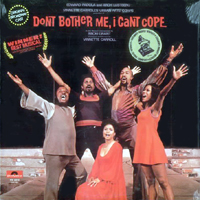 Original Broadway Cast, 1972 (Polydorl/no CD)
Original Broadway Cast, 1972 (Polydorl/no CD)  (2 / 5) Here’s an example of the sort of show that’s much more effective onstage than on record. It was easy to get caught up in a live performance of this revue, which sometimes seemed like a revival meeting. As recorded, though, Don’t Bother Me, I Can’t Cope emerges as little more than a collection of R&B numbers, all presented with the same intensity. There’s a tremendous sameness to the material. Micki Grant, who won great acclaim for her songs (and who later wrote some of the best material in Working), heads the cast, which also includes Alex Bradford, Hope Clarke, Bobby Hill, and Arnold Wilkerson. — David Wolf
(2 / 5) Here’s an example of the sort of show that’s much more effective onstage than on record. It was easy to get caught up in a live performance of this revue, which sometimes seemed like a revival meeting. As recorded, though, Don’t Bother Me, I Can’t Cope emerges as little more than a collection of R&B numbers, all presented with the same intensity. There’s a tremendous sameness to the material. Micki Grant, who won great acclaim for her songs (and who later wrote some of the best material in Working), heads the cast, which also includes Alex Bradford, Hope Clarke, Bobby Hill, and Arnold Wilkerson. — David Wolf
Don’t Play Us Cheap
 Original Broadway Cast, 1972 (Stax, 2LPs)
Original Broadway Cast, 1972 (Stax, 2LPs)  (1 / 5) This Melvin Van Peebles musical is as different from his earlier Ain’t Supposed to Die a Natural Death as it could be. Though plotless, the earlier show is dramatic and intensely theatrical, whereas Don’t Play Us Cheap tells a friendly, comical story of two imps who give their souls to the devil. Before they can qualify as full-fledged demons, they must prove their skills by wrecking a party; so they crash a Harlem affair, but their efforts to create mayhem are complicated when one imp falls in love with a young woman who’s throwing the party. The numbers embrace jazz, blues, gospel, pop, and R&B. The cast album, originally released as a two-LP set, contains the entire score, including seven instrumental selections. Unfortunately, the songs don’t function dramatically, and the piece is too loosely constructed to have any real impact. The imps are played by Joe Hughes, Jr. and the legendary Avon Long, the latter charming as ever in his only solo, “The Phoney Game.” Esther Rolle and Rhetta Hughes are heard as the women who give the party. — David Wolf
(1 / 5) This Melvin Van Peebles musical is as different from his earlier Ain’t Supposed to Die a Natural Death as it could be. Though plotless, the earlier show is dramatic and intensely theatrical, whereas Don’t Play Us Cheap tells a friendly, comical story of two imps who give their souls to the devil. Before they can qualify as full-fledged demons, they must prove their skills by wrecking a party; so they crash a Harlem affair, but their efforts to create mayhem are complicated when one imp falls in love with a young woman who’s throwing the party. The numbers embrace jazz, blues, gospel, pop, and R&B. The cast album, originally released as a two-LP set, contains the entire score, including seven instrumental selections. Unfortunately, the songs don’t function dramatically, and the piece is too loosely constructed to have any real impact. The imps are played by Joe Hughes, Jr. and the legendary Avon Long, the latter charming as ever in his only solo, “The Phoney Game.” Esther Rolle and Rhetta Hughes are heard as the women who give the party. — David Wolf
Donnybrook!
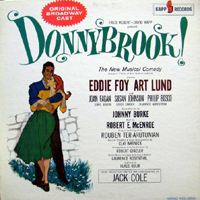 Original Broadway Cast, 1961 (Kapp)
Original Broadway Cast, 1961 (Kapp)  (4 / 5) This musical based on the movie The Quiet Man was a spirited but unsuccessful show. Donnybrook! did boast an excellent cast that included Susan Johnson, Eddie Foy Jr., and Art Lund, plus a wonderful score by Johnny Burke, who achieved fame by penning terrific lyrics to the music of Jimmy Van Heusen and others for dozens of Hollywood musicals. The songs are tuneful, funny, and romantic. “I Wouldn’t Bet One Penny,” “Ellen Roe,” “A Quiet Life,” “Dee-lightful Is the Word,” “The Loveable Irish,” “Sez I,” and “He Makes Me Feel I’m Lovely” may not be household titles, but they are excellent examples of Broadway songwriting at its best. Joan Fagan brings great spirit to several of the Burke ballads. Johnson, one of the theater’s top belters, also shows warmth and vulnerability here; she and Foy have a wonderfully charming comic rapport. And Lund sings with feeling, if not quite the requisite amount of theatricality. The album, which has not been officially transferred to CD as of this writing but is available through iTunes, sounds clear and immediate — but note that it was recorded in the heyday of the stereo-separation craze, so everyone sings left or right of center. Make an effort to find the recording and get acquainted with its many charms. — Ken Bloom
(4 / 5) This musical based on the movie The Quiet Man was a spirited but unsuccessful show. Donnybrook! did boast an excellent cast that included Susan Johnson, Eddie Foy Jr., and Art Lund, plus a wonderful score by Johnny Burke, who achieved fame by penning terrific lyrics to the music of Jimmy Van Heusen and others for dozens of Hollywood musicals. The songs are tuneful, funny, and romantic. “I Wouldn’t Bet One Penny,” “Ellen Roe,” “A Quiet Life,” “Dee-lightful Is the Word,” “The Loveable Irish,” “Sez I,” and “He Makes Me Feel I’m Lovely” may not be household titles, but they are excellent examples of Broadway songwriting at its best. Joan Fagan brings great spirit to several of the Burke ballads. Johnson, one of the theater’s top belters, also shows warmth and vulnerability here; she and Foy have a wonderfully charming comic rapport. And Lund sings with feeling, if not quite the requisite amount of theatricality. The album, which has not been officially transferred to CD as of this writing but is available through iTunes, sounds clear and immediate — but note that it was recorded in the heyday of the stereo-separation craze, so everyone sings left or right of center. Make an effort to find the recording and get acquainted with its many charms. — Ken Bloom
A Doll’s Life
 Original Broadway Cast, 1982 (Original Cast Records/Columbia Special Products/Bay Cities)
Original Broadway Cast, 1982 (Original Cast Records/Columbia Special Products/Bay Cities)  (3 / 5) A Doll’s Life is about what happened to Henrik Ibsen’s Nora after she slammed the door at the end of A Doll’s House. Betty Comden and Adolph Green wrote the book and lyrics, Larry Grossman wrote the music, and Harold Prince directed. The show opened on Broadway to terrible reviews and closed after five performances — but, fortunately, it yielded a cast recording. There’s a lot that’s wrong with the score but also a lot that’s very right with it, as the album reveals. Most outstanding is Betsy Joslyn in the enormously taxing central role. Nora’s songs range from low belt through mid-range mix to high soprano. The character’s progression from frightened doll-wife through many bedrooms and boardrooms to successful business woman, until she finally returns home to confront her husband, is charted with dramatic and musical complexity, and Joslyn is more than up to the role’s challenges. She’s expressive in her heartfelt “Letter to the Children,” probing in “Learn to Be Lonely,” sensual in “No More Mornings,” triumphant in “Power,” and urgent in “Can You Hear Me Now?” These excellent solo pieces alone would make this recording worthwhile, but there are also fine performances by Peter Gallagher, particularly effective in “Stay With Me, Nora,” and George Hearn, who lends his authoritative baritone to “You Interest Me.” Most of the score has an operatic flavor — it even includes a mini-opera called “Loki and Baldur” — so it’s not surprising that all the supporting cast members have strong, legit voices. Ultimately, what’s wrong with A Doll’s Life? Well, a few numbers don’t work at all, and may even cause a groan or two. But, of course, you can skip around at will on a recording, and this cast album is definitely worth a try. — Jeffrey Dunn
(3 / 5) A Doll’s Life is about what happened to Henrik Ibsen’s Nora after she slammed the door at the end of A Doll’s House. Betty Comden and Adolph Green wrote the book and lyrics, Larry Grossman wrote the music, and Harold Prince directed. The show opened on Broadway to terrible reviews and closed after five performances — but, fortunately, it yielded a cast recording. There’s a lot that’s wrong with the score but also a lot that’s very right with it, as the album reveals. Most outstanding is Betsy Joslyn in the enormously taxing central role. Nora’s songs range from low belt through mid-range mix to high soprano. The character’s progression from frightened doll-wife through many bedrooms and boardrooms to successful business woman, until she finally returns home to confront her husband, is charted with dramatic and musical complexity, and Joslyn is more than up to the role’s challenges. She’s expressive in her heartfelt “Letter to the Children,” probing in “Learn to Be Lonely,” sensual in “No More Mornings,” triumphant in “Power,” and urgent in “Can You Hear Me Now?” These excellent solo pieces alone would make this recording worthwhile, but there are also fine performances by Peter Gallagher, particularly effective in “Stay With Me, Nora,” and George Hearn, who lends his authoritative baritone to “You Interest Me.” Most of the score has an operatic flavor — it even includes a mini-opera called “Loki and Baldur” — so it’s not surprising that all the supporting cast members have strong, legit voices. Ultimately, what’s wrong with A Doll’s Life? Well, a few numbers don’t work at all, and may even cause a groan or two. But, of course, you can skip around at will on a recording, and this cast album is definitely worth a try. — Jeffrey Dunn
Do I Hear a Waltz?
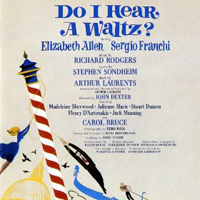 Original Broadway Cast, 1965 (Columbia/Sony)
Original Broadway Cast, 1965 (Columbia/Sony)  (4 / 5) Stephen Sondheim has often bad-mouthed Do I Hear a Waltz? — perhaps because it can’t compare to his trail-blazing hits, and also because Sondheim apparently wrote some lyrics that were not acceptable to composer Richard Rodgers and, therefore, didn’t make it into the show. But while Arthur Laurents’ book is a bit of a confused bore, the Rodgers-Sondheim score is really good. The musical is an adaptation of Laurents’ play The Time of the Cuckoo. The story: Spinster Leona Samish (Elizabeth Allen) travels to Venice and meets attractive Renato Di Rossi (Sergio Franchi), but she isn’t trusting enough to allow herself to fall in love with him. The show starts briskly with “Someone Woke Up,” Leona’s claim that she’s ready for anything. It continues well with “This Week, Americans,” in which the proprietor of the pensione at which Leona is staying (Carol Bruce) charms her guests. “What Do We Do? We Fly,” a sharply humorous group number about transatlantic air travel, follows. Rodgers gets in his bolt-of-lightning ballads with “Someone Like You” and “Take the Moment,” as well as the lovely title song — a waltz, natch. Also enjoyable is “Bargaining,” in which Renato teaches Leona the ins and outs of shopping in Venice. Only “We’re Gonna Be All Right” seems like filler, but there’s a reason for that; see below. — Peter Filichia
(4 / 5) Stephen Sondheim has often bad-mouthed Do I Hear a Waltz? — perhaps because it can’t compare to his trail-blazing hits, and also because Sondheim apparently wrote some lyrics that were not acceptable to composer Richard Rodgers and, therefore, didn’t make it into the show. But while Arthur Laurents’ book is a bit of a confused bore, the Rodgers-Sondheim score is really good. The musical is an adaptation of Laurents’ play The Time of the Cuckoo. The story: Spinster Leona Samish (Elizabeth Allen) travels to Venice and meets attractive Renato Di Rossi (Sergio Franchi), but she isn’t trusting enough to allow herself to fall in love with him. The show starts briskly with “Someone Woke Up,” Leona’s claim that she’s ready for anything. It continues well with “This Week, Americans,” in which the proprietor of the pensione at which Leona is staying (Carol Bruce) charms her guests. “What Do We Do? We Fly,” a sharply humorous group number about transatlantic air travel, follows. Rodgers gets in his bolt-of-lightning ballads with “Someone Like You” and “Take the Moment,” as well as the lovely title song — a waltz, natch. Also enjoyable is “Bargaining,” in which Renato teaches Leona the ins and outs of shopping in Venice. Only “We’re Gonna Be All Right” seems like filler, but there’s a reason for that; see below. — Peter Filichia
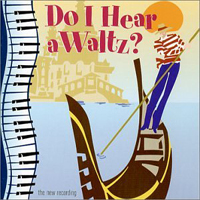 Pasadena Playhouse Cast, 2001 (Fynsworth Alley)
Pasadena Playhouse Cast, 2001 (Fynsworth Alley)  (4 / 5) On this recording, Steve Orich’s brisker musical direction helps make Do I Hear a Waltz? sound like a hit. Alyson Reed and Anthony Crivello have more personality than their Broadway counterparts, and what fun it is to hear Carol Lawrence on a cast album after too long an absence, playing the landlady of the pensione. Only Tina Gasparra, as her maid, disappoints as she tries much too hard to sound comic. There is one significant, unfortunate cut: “Bargaining” was a charming song, and an important one because it made us like Renato, so it’s a shame to lose it. On the other hand, there’s a nifty reprise of “This Week, Americans” and other additions and restorations. Most notably, the previously excised lyrics of “We’re Gonna Be All Right” make an incisive and sophisticated song out of what had just been a pleasant throwaway number. If these lyrics are an indication of what Sondheim was forced to eliminate at Rodgers’ insistence, we can begin to understand why the guy can’t stand this show. — P.F.
(4 / 5) On this recording, Steve Orich’s brisker musical direction helps make Do I Hear a Waltz? sound like a hit. Alyson Reed and Anthony Crivello have more personality than their Broadway counterparts, and what fun it is to hear Carol Lawrence on a cast album after too long an absence, playing the landlady of the pensione. Only Tina Gasparra, as her maid, disappoints as she tries much too hard to sound comic. There is one significant, unfortunate cut: “Bargaining” was a charming song, and an important one because it made us like Renato, so it’s a shame to lose it. On the other hand, there’s a nifty reprise of “This Week, Americans” and other additions and restorations. Most notably, the previously excised lyrics of “We’re Gonna Be All Right” make an incisive and sophisticated song out of what had just been a pleasant throwaway number. If these lyrics are an indication of what Sondheim was forced to eliminate at Rodgers’ insistence, we can begin to understand why the guy can’t stand this show. — P.F.
Do Black Patent Leather Shoes Really Reflect Up?
 Original Broadway Cast Members, 1985 (Bay Cities/Original Cast) No stars; not recommended. No matter how “informed” the writer of a review is, the critique is largely a matter of opinion. Or as Cole Porter put it, “I like Offenbach, you do not / So what? So what? So what?” Which is my way of explaining that I greatly dislike Do Patent Leather Shoes Really Reflect Up?, even though I know the show has been hugely successful in stagings around the country and is, in fact, the longest running musical ever to play Chicago. It’s certainly possible that I would respond more favorably to it if I had attended parochial school or were a Catholic — or if, like the show’s main character, I’d fallen in love with a girl in the fifth grade, watched as she became a nun and then, years later, reunited with her after she left the convent. Not having had those experiences, I view this musical as unevocative nostalgia without the slightest bit of insight or wit. For the record, the music and lyrics are by Alaric Jans and James Quinn, the book by John R. Powers. — David Wolf
Original Broadway Cast Members, 1985 (Bay Cities/Original Cast) No stars; not recommended. No matter how “informed” the writer of a review is, the critique is largely a matter of opinion. Or as Cole Porter put it, “I like Offenbach, you do not / So what? So what? So what?” Which is my way of explaining that I greatly dislike Do Patent Leather Shoes Really Reflect Up?, even though I know the show has been hugely successful in stagings around the country and is, in fact, the longest running musical ever to play Chicago. It’s certainly possible that I would respond more favorably to it if I had attended parochial school or were a Catholic — or if, like the show’s main character, I’d fallen in love with a girl in the fifth grade, watched as she became a nun and then, years later, reunited with her after she left the convent. Not having had those experiences, I view this musical as unevocative nostalgia without the slightest bit of insight or wit. For the record, the music and lyrics are by Alaric Jans and James Quinn, the book by John R. Powers. — David Wolf
Funny Girl
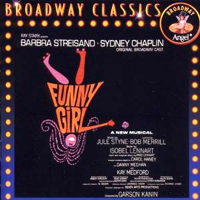 Original Broadway Cast, 1964 (Capitol/Angel)
Original Broadway Cast, 1964 (Capitol/Angel)  (5 / 5) It’s rare that we have concrete recorded proof of the exact moment when a performer became a legend, but that’s the case with the original Broadway cast album of Funny Girl. Yes, this recording of the Fanny Brice biomusical has that wonderful collection of Jule Styne-Bob Merrill songs; vivid performances by Sydney Chaplin as Nick Arnstein, Kay Medford as Fanny’s mother, Danny Meehan as her showbiz pal Eddie Ryan, and Jean Stapleton as a family friend; a killer overture, more than good enough to rival Gypsy’s; Ralph Burns’ opulent orchestrations; and Milton Rosenstock’s excellent musical direction/conducting. But what matters most is Barbra Streisand, who deservedly shot to super-stardom playing Brice. She’s never been fresher or more appealing than she is here in “I’m the Greatest Star,” “Cornet Man,” “Who Are You Now?”, “Don’t Rain on My Parade,” “The Music That Makes Me Dance,” and the definitive rendition of “People.” Streisand uses her sprawling belt, liberally doused with her natural tenacity and eccentricity, to make these songs sound like no one else should even think about singing them for fear of paling in comparison. Even so, her ambitious approach to the songs is always held in check by a complete commitment to character. More than 50 years after this cast album was made, Streisand’s performance still represents the best of what Broadway can be, and propels the recording from “excellent” to “essential.” — Matthew Murray
(5 / 5) It’s rare that we have concrete recorded proof of the exact moment when a performer became a legend, but that’s the case with the original Broadway cast album of Funny Girl. Yes, this recording of the Fanny Brice biomusical has that wonderful collection of Jule Styne-Bob Merrill songs; vivid performances by Sydney Chaplin as Nick Arnstein, Kay Medford as Fanny’s mother, Danny Meehan as her showbiz pal Eddie Ryan, and Jean Stapleton as a family friend; a killer overture, more than good enough to rival Gypsy’s; Ralph Burns’ opulent orchestrations; and Milton Rosenstock’s excellent musical direction/conducting. But what matters most is Barbra Streisand, who deservedly shot to super-stardom playing Brice. She’s never been fresher or more appealing than she is here in “I’m the Greatest Star,” “Cornet Man,” “Who Are You Now?”, “Don’t Rain on My Parade,” “The Music That Makes Me Dance,” and the definitive rendition of “People.” Streisand uses her sprawling belt, liberally doused with her natural tenacity and eccentricity, to make these songs sound like no one else should even think about singing them for fear of paling in comparison. Even so, her ambitious approach to the songs is always held in check by a complete commitment to character. More than 50 years after this cast album was made, Streisand’s performance still represents the best of what Broadway can be, and propels the recording from “excellent” to “essential.” — Matthew Murray
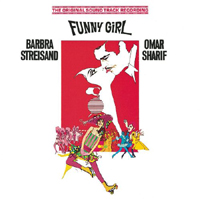 Film Soundtrack, 1968 (Columbia/Sony)
Film Soundtrack, 1968 (Columbia/Sony)  (3 / 5) It’s fascinating to compare Barbra Streisand’s performances on the original Broadway cast album and the film soundtrack of Funny Girl. Though only about four years passed between the two recordings, the star’s approach to these songs changed drastically, no doubt partly because she was tailoring her renditions to the film medium, but also because Streisand’s performance style had already at that point started to become far more self-aware — some might say self-indulgent — than the thrilling, raw talent she had displayed on Broadway. The quality of her phenomenal voice itself is at its zenith on the soundtrack recordings of “People,” “Don’t Rain on My Parade,” etc., and the comedy of such songs as “I’m the Greatest Star,” “His Love Makes Me Beautiful,” and “You are Woman, I am Man” is far funnier than on the OBC recording, thanks to better timing and more sharply honed comic chops. But some listeners may find Streisand’s embellishments of some of the vocal lines to be a bit much here. One example of several: When she sings “Lovers are very special people,” swooping down to the bottom of her vocal range on the second syllables of both “lovers” and “people,” she sounds more like a show-off pop or jazz singer than a credible character in a musical. On top of all this, changes to the song stack have tilted the balance of the film and the album even more sharply toward Streisand: a new, mediocre title song and the not-especially-funny comic number “The Swan,” both by Jule Styne and Bob Merrill, have been added, along with the Fanny Brice signature songs “I’d Rather Be Blue” and “My Man,” those latter two additions arguably damaging the integrity of the Styne/Merrill score. Meanwhile the cutting of such Broadway numbers as “Who Taught Her Everything,” “I Want to Be Seen With You,” and “Find Yourself a Man” have eliminated almost all solo singing from anyone else in the film; the two significant exceptions are “If a Girl Isn’t Pretty,” featuring Kay Medford as Fanny’s mother and Mae Questel as Mrs. Strakosh, and “You Are Woman, I Am Man,” in which Omar Sharif as Nicky Arnstein has a lovely if brief duet with Streisand. For the record, three Styne/Merrill songs that Streisand sang in Funny Girl on Broadway — “Cornet Man,” “Who Are You Now?” and “The Music that Makes Me Dance” — have also been axed, so please turn to the OBC album to enjoy those. On a positive note, the soundtrack orchestrations are lovely and lush without being syrupy. Given the sales figures for this recording, it’s obvious that many people — including this reviewer — love it for what it is, but it’s probably best enjoyed as an album of “Barbra Streisand Sings Songs from Funny Girl” rather than the soundtrack of a film musical. — Michael Portantiere
(3 / 5) It’s fascinating to compare Barbra Streisand’s performances on the original Broadway cast album and the film soundtrack of Funny Girl. Though only about four years passed between the two recordings, the star’s approach to these songs changed drastically, no doubt partly because she was tailoring her renditions to the film medium, but also because Streisand’s performance style had already at that point started to become far more self-aware — some might say self-indulgent — than the thrilling, raw talent she had displayed on Broadway. The quality of her phenomenal voice itself is at its zenith on the soundtrack recordings of “People,” “Don’t Rain on My Parade,” etc., and the comedy of such songs as “I’m the Greatest Star,” “His Love Makes Me Beautiful,” and “You are Woman, I am Man” is far funnier than on the OBC recording, thanks to better timing and more sharply honed comic chops. But some listeners may find Streisand’s embellishments of some of the vocal lines to be a bit much here. One example of several: When she sings “Lovers are very special people,” swooping down to the bottom of her vocal range on the second syllables of both “lovers” and “people,” she sounds more like a show-off pop or jazz singer than a credible character in a musical. On top of all this, changes to the song stack have tilted the balance of the film and the album even more sharply toward Streisand: a new, mediocre title song and the not-especially-funny comic number “The Swan,” both by Jule Styne and Bob Merrill, have been added, along with the Fanny Brice signature songs “I’d Rather Be Blue” and “My Man,” those latter two additions arguably damaging the integrity of the Styne/Merrill score. Meanwhile the cutting of such Broadway numbers as “Who Taught Her Everything,” “I Want to Be Seen With You,” and “Find Yourself a Man” have eliminated almost all solo singing from anyone else in the film; the two significant exceptions are “If a Girl Isn’t Pretty,” featuring Kay Medford as Fanny’s mother and Mae Questel as Mrs. Strakosh, and “You Are Woman, I Am Man,” in which Omar Sharif as Nicky Arnstein has a lovely if brief duet with Streisand. For the record, three Styne/Merrill songs that Streisand sang in Funny Girl on Broadway — “Cornet Man,” “Who Are You Now?” and “The Music that Makes Me Dance” — have also been axed, so please turn to the OBC album to enjoy those. On a positive note, the soundtrack orchestrations are lovely and lush without being syrupy. Given the sales figures for this recording, it’s obvious that many people — including this reviewer — love it for what it is, but it’s probably best enjoyed as an album of “Barbra Streisand Sings Songs from Funny Girl” rather than the soundtrack of a film musical. — Michael Portantiere
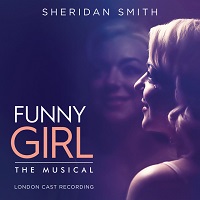 London Cast, 2016 (Decca)
London Cast, 2016 (Decca)  (2 / 5) Before Funny Girl‘s first Broadway revival (or, rather, revisal) in 2022, director Michael Mayer and writer Harvey Fierstein headed the creative team of a London production in 2016. Originating at the Menier Chocolate Factory, this was the first time the West End has seen the show since Streisand debuted it there following her Broadway triumph. The production starred Olivier Award winner Sheridan Smith, and was enough of a success with critics and audiences that it resulted in a cast recording and laid the groundwork for the Broadway transfer with Mayer and Fierstein still at the helm, but with an entirely different cast (see review below). While there are some enjoyable elements to this album, many of the same problems that would plague the Broadway production are evident here, and sadly, almost all of the changes made to the song stack are for the worse. Smith, who’s had multiple successes in musicals on the West End, is a mixed bag as Fanny Brice. On the plus side, she’s naturally funny and gives the character a unique spin that’s separate enough from Streisand without altering the DNA of the material. Her “You are Woman, I am Man” and “His Love Makes Me Beautiful” are fun as Smith makes a meal of the comedic fodder. Her voice, however, is strong only intermittently; while she can carry herself through most of the uptempo numbers (“Cornet Man,” “I’m the Greatest Star”), Smith has difficulty floating any of Fanny’s ballads (“People,” “The Music That Makes Me Dance.”) Darius Campbell is a decent Nick Arnstein, but he’s unfortunately saddled with “Temporary Arrangement,” a song that was cut from the original Broadway production of Funny Girl out of town and should never have been restored. Chris Walker’s orchestrations sound much fuller here than on the subsequent Broadway recording, and the tempi are not as sped through. While this recording isn’t by any means a disaster, it’s far from essential listening. — Matt Koplik
(2 / 5) Before Funny Girl‘s first Broadway revival (or, rather, revisal) in 2022, director Michael Mayer and writer Harvey Fierstein headed the creative team of a London production in 2016. Originating at the Menier Chocolate Factory, this was the first time the West End has seen the show since Streisand debuted it there following her Broadway triumph. The production starred Olivier Award winner Sheridan Smith, and was enough of a success with critics and audiences that it resulted in a cast recording and laid the groundwork for the Broadway transfer with Mayer and Fierstein still at the helm, but with an entirely different cast (see review below). While there are some enjoyable elements to this album, many of the same problems that would plague the Broadway production are evident here, and sadly, almost all of the changes made to the song stack are for the worse. Smith, who’s had multiple successes in musicals on the West End, is a mixed bag as Fanny Brice. On the plus side, she’s naturally funny and gives the character a unique spin that’s separate enough from Streisand without altering the DNA of the material. Her “You are Woman, I am Man” and “His Love Makes Me Beautiful” are fun as Smith makes a meal of the comedic fodder. Her voice, however, is strong only intermittently; while she can carry herself through most of the uptempo numbers (“Cornet Man,” “I’m the Greatest Star”), Smith has difficulty floating any of Fanny’s ballads (“People,” “The Music That Makes Me Dance.”) Darius Campbell is a decent Nick Arnstein, but he’s unfortunately saddled with “Temporary Arrangement,” a song that was cut from the original Broadway production of Funny Girl out of town and should never have been restored. Chris Walker’s orchestrations sound much fuller here than on the subsequent Broadway recording, and the tempi are not as sped through. While this recording isn’t by any means a disaster, it’s far from essential listening. — Matt Koplik
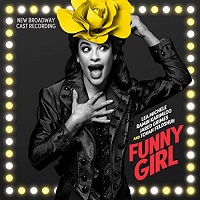 Broadway Cast, 2022 (Masterworks Broadway)
Broadway Cast, 2022 (Masterworks Broadway)  (4 / 5) Although Funny Girl was a hit on stage and film, it had a rough road returning to Broadway, the consensus being that Barbra Streisand’s performance in the central role of Fanny Brice had cast too large a shadow over the property. When the show finally came back in 2022, the headliner was Beanie Feldstein, primarily known for her work in television and film. Both the production and Feldstein’s performance were maligned by critics, many finding the design elements cheap and the star’s voice wanting for a score that demands excellence, and Feldstein departed quickly. Enter Lea Michele, whose performance was praised despite some controversy surrounding her reported bad behavior and lack of professionalism in previous projects, and Funny Girl’s fortunes immediately turned around, resulting in a mostly rewarding cast album. On the downside: Although the orchestra was augmented for this recording, it still sounds shallow, and Chris Walker’s orchestrations are more miss than hit. (The overture sounds especially anemic.) This production, like its London predecessor, incorporated musical and textual changes from the show as originally written, with a revised book by Harvey Fierstein. Unfortunately, these changes are mostly for the worse. Ramin Karimloo is a suave Nick Arnstein, even if his modern-sounding tenor clashes somewhat with the classic style of Jule Styne’s score and, as was the case with his London counterpart, he benefits not at all from the reinstatement of the song “Temporary Arrangement.” On a brighter note, Karimloo does beautiful work when singing with Michele, as in a duet version of “Who Are You Now?” (previously a solo for Fanny). Tovah Feldshuh brings authentic New York Jewish grit to Mrs. Brice, and Jared Grimes is charismatic as Eddie, but it’s Michele who makes this album an essential listen with a true star turn. If listeners detect hints of Streisand in some of her vocal inflections, that’s to be expected, as many of Streisand’s signature indulgences have become synonymous with the material. Michele attacks “I’m the Greatest Star” and “Cornet Man” with driven energy, then settles down and lures in the listener with “People” and the score’s other pensive ballads — just like Babs. And when Michele gets her determined grip on “Don’t Rain on My Parade,” you feel as if you’ve heard her wring every ounce of juice possible from one of the musical theater’s greatest Act I finales. It may have taken nearly 60 years, but cast album collectors finally have another quality Fanny Brice to enjoy. – M.K.
(4 / 5) Although Funny Girl was a hit on stage and film, it had a rough road returning to Broadway, the consensus being that Barbra Streisand’s performance in the central role of Fanny Brice had cast too large a shadow over the property. When the show finally came back in 2022, the headliner was Beanie Feldstein, primarily known for her work in television and film. Both the production and Feldstein’s performance were maligned by critics, many finding the design elements cheap and the star’s voice wanting for a score that demands excellence, and Feldstein departed quickly. Enter Lea Michele, whose performance was praised despite some controversy surrounding her reported bad behavior and lack of professionalism in previous projects, and Funny Girl’s fortunes immediately turned around, resulting in a mostly rewarding cast album. On the downside: Although the orchestra was augmented for this recording, it still sounds shallow, and Chris Walker’s orchestrations are more miss than hit. (The overture sounds especially anemic.) This production, like its London predecessor, incorporated musical and textual changes from the show as originally written, with a revised book by Harvey Fierstein. Unfortunately, these changes are mostly for the worse. Ramin Karimloo is a suave Nick Arnstein, even if his modern-sounding tenor clashes somewhat with the classic style of Jule Styne’s score and, as was the case with his London counterpart, he benefits not at all from the reinstatement of the song “Temporary Arrangement.” On a brighter note, Karimloo does beautiful work when singing with Michele, as in a duet version of “Who Are You Now?” (previously a solo for Fanny). Tovah Feldshuh brings authentic New York Jewish grit to Mrs. Brice, and Jared Grimes is charismatic as Eddie, but it’s Michele who makes this album an essential listen with a true star turn. If listeners detect hints of Streisand in some of her vocal inflections, that’s to be expected, as many of Streisand’s signature indulgences have become synonymous with the material. Michele attacks “I’m the Greatest Star” and “Cornet Man” with driven energy, then settles down and lures in the listener with “People” and the score’s other pensive ballads — just like Babs. And when Michele gets her determined grip on “Don’t Rain on My Parade,” you feel as if you’ve heard her wring every ounce of juice possible from one of the musical theater’s greatest Act I finales. It may have taken nearly 60 years, but cast album collectors finally have another quality Fanny Brice to enjoy. – M.K.

